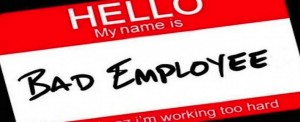 In a decision sure to grab the attention of the New Jersey workforce, today the New Jersey Supreme Court unanimously ruled that an employer can recover the salary of an employee who breaches his duty of loyalty to the employer, without the necessity of the employer proving economic loss as a result of the duty breach. Kaye vs. Rosefielde, Docket No.: A-93-13 (September 22, 2015). In so ruling, our State’s highest court reversed a lower appeals court which had ruled in favor of the employee on the issue of salary disgorgement, and reaffirmed the principles of its earlier decision of Cameco, Inc. v. Gedicke, 157 N.J. 504 (1999).
In a decision sure to grab the attention of the New Jersey workforce, today the New Jersey Supreme Court unanimously ruled that an employer can recover the salary of an employee who breaches his duty of loyalty to the employer, without the necessity of the employer proving economic loss as a result of the duty breach. Kaye vs. Rosefielde, Docket No.: A-93-13 (September 22, 2015). In so ruling, our State’s highest court reversed a lower appeals court which had ruled in favor of the employee on the issue of salary disgorgement, and reaffirmed the principles of its earlier decision of Cameco, Inc. v. Gedicke, 157 N.J. 504 (1999).
The underlying facts of the case involved a lawyer (Rosefielde) who was hired to act as Chief Operating Officer for three entities that sell and manage timeshare interests in resort properties in Atlantic County, New Jersey. Initially, Rosefielde was used as outside counsel, and later was hired as a direct employee. Following a 4-month period the parties agreed that Rosefielde would earn an annual salary of $500,000.
For approximately two years, Rosefielde served as the companies’ Chief Operating Officer, and effectively functioned as their general counsel. In that capacity, Rosefielde committed serious misconduct by acting on his own behalf instead of for his employers’ benefit, and exposing his employers to potential liability. The companies’ terminated his employment as a result of this malfeasance and poor performance.
Plaintiffs then filed suit against Rosefielde, alleging claims for breach of fiduciary duty, fraud, legal malpractice, unlicensed practice of law, and breach of the duty of loyalty. Among the damages plaintiffs sought to recover from Rosefielde was the prior salary he received – also referred to as the remedy of equitable disgorgement. While the trial court ruled in plaintiffs’ favor and awarded compensatory and punitive damages, and legal fees, the trial court rejected the equitable disgorgement claim as a remedy for Rosefield’s breach of the duty of loyalty by holding that his breach did not result in any actual damage to his employers.
On appeal, the Appellate Division affirmed the trial court’s ruling on the equitable disgorgement remedy. The NJ Supreme Court agreed to hear the case on the limited issue of whether a court may award the remedy of disgorgement of a disloyal employee’s salary to an employer that has not sustained any economic damage.
The NJ Supreme Court explained that equitable disgorgement is a remedy derived from principles of contract law that recognize that if the employee breaches the duty of loyalty at the heart of the employment relationship, he may be compelled to forego the compensation earned during the period of disloyalty. The disgorgement remedy is consonant with the purpose of a breach of the duty of loyalty claim because, when an employee abuses his position and breaches the duty of loyalty, the employee fails to meet the employer’s expectation of loyalty in the performance of the job duties for which he is paid. Disgorgement may also have a valuable deterrent effect providing notice that adverse consequences will follow a breach of the duty of loyalty.
Recognizing that courts have broad discretion to fashion the appropriate equitable remedies that are fair and practical, the Court held that the remedy of equitable disgorgement may be awarded in an appropriate case even when an employer has not sustained an economic as a result of the employee’s disloyalty. The Court clarified that disgorgement of a disloyal employee’s salary should be limited to the compensation received during the period in which the employee breached the duty of loyalty.
The NJ Supreme Court’s Opinion in Kaye establishes the following factors that trial courts must apply in deciding whether disgorgement is an appropriate remedy:
- the employee’s degree of responsibility and level of compensation;
- the number of acts of disloyalty;
- the extent to which those acts placed the employer’s business in jeopardy; and
- the degree of planning to undermine the employerthat is undertaken by the employee.
Where appropriate,a trial court should apportion the employee’s compensation, rather than ordering a wholesale disgorgement that may be disproportionate to the misconduct at issue.
This case represents a significant victory for employers. Employees who act with disloyalty are now on notice that recovery of prior compensation received is fair game for their employers.

 In a decision sure to grab the attention of the New Jersey workforce, today the New Jersey Supreme Court unanimously ruled that an employer can recover the salary of an employee who breaches his duty of loyalty to the employer, without the necessity of the employer proving economic loss as a result of the duty breach. Kaye vs. Rosefielde, Docket No.: A-93-13 (September 22, 2015). In so ruling, our State’s highest court reversed a lower appeals court which had ruled in favor of the employee on the issue of salary disgorgement, and reaffirmed the principles of its earlier decision of
In a decision sure to grab the attention of the New Jersey workforce, today the New Jersey Supreme Court unanimously ruled that an employer can recover the salary of an employee who breaches his duty of loyalty to the employer, without the necessity of the employer proving economic loss as a result of the duty breach. Kaye vs. Rosefielde, Docket No.: A-93-13 (September 22, 2015). In so ruling, our State’s highest court reversed a lower appeals court which had ruled in favor of the employee on the issue of salary disgorgement, and reaffirmed the principles of its earlier decision of 